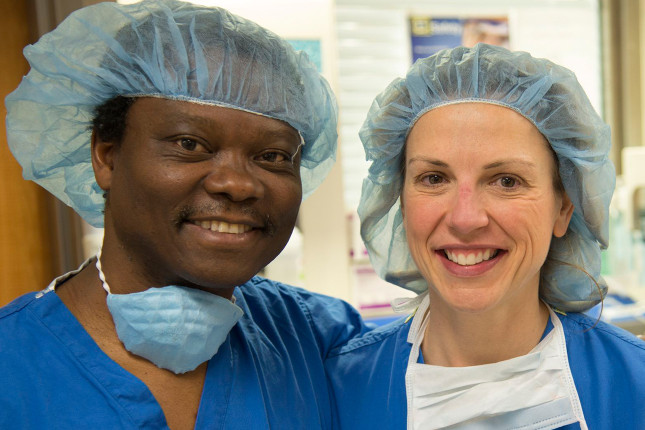
Washington University School of Medicine is committed to the recruitment, retention and professional development of a diverse faculty.
This commitment is reflected among the core goals of the Office of Faculty Promotions and Career Development, headed by Renee Shellhaas, MD, MS and the Office of Diversity, Equity and Inclusion, headed by Sherree Wilson, PhD. These include
- Striving for a consistent, supportive working environment, framed by appropriate guidance and mentorship, to sustain all faculty members in achieving their full professional potential.
- Enhancing communication between administration and faculty, including facilitation of understanding of institutional policies, procedures and roles and national issues of interest related to faculty professional development.
- Promoting a gender-neutral environment, which includes increased representation of women on the faculty, particularly at the most senior levels.
- Working toward a substantial increase in faculty diversity at all levels through increased recruitment, retention and advancement of underrepresented ethnic minorities.
In 2005 the School of Medicine launched a wide-reaching initiative to encourage departments to hire and retain faculty from diverse backgrounds. The effort goes hand in hand with a Barnes-Jewish Hospital strategy that aims to recruit more residents and fellows from underrepresented groups.
Stay in touch
Tell us more about yourselves by filling out the Directory Update form »
Faculty Diversity Scholars Program
The Faculty Diversity Scholars Program, created by the Faculty Diversity Committee and Larry J. Shapiro, MD, former dean of the School of Medicine, includes an incentive plan for departments to recruit faculty from minority groups.
“The growing cultural diversity of America is a phenomenon that will reshape the practice of medicine in the 21st century and beyond. We are responding to the changing demographics of this nation and the increasing health needs of our own community by improving our enrollment of students and the recruitment of faculty from underrepresented groups,” Shapiro said. Since its inception seventeen scholars have been recruited.
Minority faculty at Washington University have embraced this sense of ”family” and collective mentoring, reflected in informal socials and networking events at the home of Will Ross, MD, MPH, associate dean for diversity.
A faculty directory is maintained to facilitate contacts and networking among faculty and medical trainees. Faculty members are encouraged to update their contact information.
Learn more about the Faculty Diversity Scholars Program »
Programs to Increase Diversity in Individuals Engaged in Health-Related Research (PRIDE) July 11-27, 2022
The Program for Inclusion and Diversity Among Individuals Engaged in Health-Related Research (PRIDE) in Cardiovascular Disease Comorbidities, Genetics, Epidemiology (CVD-CGE) was designed to provide a working knowledge and appreciation for cardiovascular disease comorbidities, genetics and epidemiology, implementation science, data science, and global health, and to integrate these skills with the mentee’s substantive research interests in CVD and Heart, Lung, Blood, and Sleep (HLBS) research.
Eligibility
An ideal candidate is highly motivated to pursue independent research in one of the HLBS or crosscutting methodological areas and willing to make a serious commitment of time and effort for achieving that goal.
Individuals from groups listed in NOT-OD-20-031 are highly encouraged to submit applications.
Participants must:
- Be a research-oriented junior-level faculty member holding a doctoral degree, such as a PhD, MD, DO, DVM or transitioning* post-doctorate trainee
- If you have been awarded grants such as an R01, you are not be considered junior-level faculty. If you have been awarded these grants, you still can be considered junior.
- Be a citizen or permanent resident of the United States
- Have a research focus that is centered on heart, lung, blood, or sleep disorders; health disparities relevant to heart, lung, blood, or sleep disorders; or relevant research methodologies and approaches specific to these areas including implementation science.
- Have career tracking for up to ten years after training is completed
- Not have attended a previous PRIDE/SIPID cohort
Visit the PRIDE application process page to learn more and complete the pre-application. Upon completion, if you meet the eligibility criteria for PRIDE participation, you will be asked to complete a full application form.
*Transitioning means that you have or will have received a formal faculty appointment by the time the Summer Institute Program convenes and no longer supported on a training grant.
Participation
Mentees are expected to participate in the following:
- Summer session 1
- A two-day, mid-year meeting, reviewing overall progress—including small research project progress, mentee presentation, and grant review process
- The PRIDE annual meeting of all PRIDE sites & National Heart, Lung, and Blood Institute staff in the Washington, DC area
- Summer session 2
- Monthly Zoom meetings
- Development and completion of a Small Research Project (SRP)
- Ideally, mentees will have their draft SRP application completed prior to starting the first summer session
- Develop competitive grant applications for pilot funding upon entering the program
- Applications for one-year small research project funding are due within 30 days of the end of summer session 1
- SRP to be completed within one year of funding
Program Dates
New Cohort 12
(summer 2025- summer 2026)
- Summer 1 (Dates and times subject to change)
- June 16, 19-24, 26-27, July 14-15, 2025 Virtual
- July 21-25, 2025 | In person
- July 28 & 31, 2025 | Virtual
- Meetings
- Mid-year Meeting 2026 (February/March)
- Annual Meeting 2026 (April TBA)
- Summer 2
- Summer 2026 (Dates to be determined)
Returning Cohort 11
(summer 2024 – 2025)
- Meetings
- Mid-year Meeting 2025 (February 10-11)
- Annual Meeting 2025 (April 21-24)
- Summer 2 (Dates and times subject to change)
- July 16-18, 2025 |
Virtual - July 24 -25, 2025 |
In person
- July 16-18, 2025 |
Learn more about the PRIDE Program »